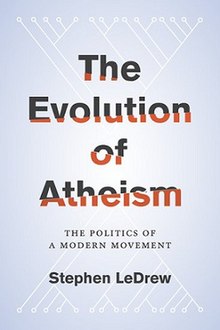
Richard Dawkins is a British evolutionary biologist and author. He is an emeritus fellow of New College, Oxford, and was Professor for Public Understanding of Science in the University of Oxford from 1995 to 2008. His 1976 book The Selfish Gene popularised the gene-centred view of evolution, as well as coining the term meme. Dawkins has won several academic and writing awards.
Secularism is the principle of seeking to conduct human affairs based on naturalistic considerations, uninvolved with religion.

Secular humanism is a philosophy, belief system or life stance that embraces human reason, logic, secular ethics, and philosophical naturalism, while specifically rejecting religious dogma, supernaturalism, and superstition as the basis of morality and decision making.
Irreligion is the neglect or active rejection of religion and, depending on the definition, a simple absence of religion.

Antony Garrard Newton Flew was an English philosopher. Belonging to the analytic and evidentialist schools of thought, Flew worked on the philosophy of religion. During the course of his career he taught philosophy at the universities of Oxford, Aberdeen, Keele, and Reading in the United Kingdom, and at York University in Toronto, Canada.

The Center for Inquiry (CFI) is a U.S. nonprofit organization that works to mitigate belief in pseudoscience and the paranormal and to fight the influence of religion in government.

The Council of Australian Humanist Societies (CAHS) is an umbrella organisation for Australian humanist societies. It was founded in 1965. It is affiliated with Humanists International. The official symbol of CAHS is the Happy Human.

The following outline is provided as an overview of and topical guide to humanism:
Atheism, in the broadest sense, is an absence of belief in the existence of deities. Less broadly, atheism is a rejection of the belief that any deities exist. In an even narrower sense, atheism is specifically the position that there are no deities. Atheism is contrasted with theism, which in its most general form is the belief that at least one deity exists.

Rebecca Watson is an American atheist blogger and YouTuber. She is the founder of the blog Skepchick and former co-host of The Skeptics' Guide to the Universe podcast. She also previously co-hosted the Little Atoms podcast.
Around 0.7 million people in India did not state their religion in the 2001 census and were counted in the "religion not stated" category. They were 0.06% of India's population. Their number has significantly increased four times, from 0.7 million in the 2001 census to 2.9 million in the 2011 census at an average annual rate of 15%. According to the 2012 WIN-Gallup Global Index of Religion and Atheism report, 81% of Indians were religious, 13% were non-religious, 3% were convinced atheists, and 3% were unsure or did not respond, while a demographic study by Cambridge University Press in 2004 found that around 2-6% of Indians identified as atheists or irreligious.
Agnostic atheism or atheistic agnosticism is a philosophical position that encompasses both atheism and agnosticism. Agnostic atheists are atheistic because they do not hold a belief in the existence of any deity and are agnostic because they claim that the existence of a divine entity or entities is either unknowable in principle or currently unknown in fact.
Atheist feminism is a branch of feminism that also advocates atheism. Atheist feminists hold that religion is a prominent source of female oppression and inequality, believing that the majority of the religions are sexist and oppressive towards women.
The term New Atheism was coined by the American journalist Gary Wolf in 2006 to describe the positions of some atheist academics, writers, scientists, and philosophers of the 21st century. New Atheism advocates the view that superstition, religion, and irrationalism should not simply be tolerated. Instead, they should be criticised, countered, examined, and challenged by rational argument, especially when they exert strong influence on the broader society, such as in government, education, and politics. Major figures of New Atheism include Richard Dawkins, Sam Harris, Christopher Hitchens and Daniel Dennett, collectively referred to as the "four horsemen" of the movement, as well as Ayaan Hirsi Ali until her conversion to Christianity in 2023.

Andrew James William Copson, FRSA, FCMI, MCIPR is a humanist leader and writer. He is the Chief Executive of Humanists UK and the President of Humanists International.
Articles related to philosophy of religion include:
Irreligion in the United Kingdom is more prevalent than in some parts of Europe, with about 8% indicating they were atheistic in 2018, and 52% listing their religion as "none". A third of Anglicans polled in a 2013 survey doubted the existence of God, while 15% of those with no religion believed in some higher power, and deemed themselves "spiritual" or even "religious".
China has the world's greatest irreligious population, and the Chinese government and the ruling Chinese Communist Party (CCP) are officially atheist. Despite limitations on certain forms of religious expression and assembly, religion is not banned, and religious freedom is nominally protected under the Chinese constitution. Among the general Chinese population, there are a wide variety of religious practices. The Chinese government's attitude to religion is one of skepticism and non-promotion.
The secular movement refers to a social and political trend in the United States, beginning in the early years of the 20th century, with the founding of the American Association for the Advancement of Atheism in 1925 and the American Humanist Association in 1941, in which atheists, agnostics, secular humanists, freethinkers, and other nonreligious and nontheistic Americans have grown in both numbers and visibility. There has been a sharp increase in the number of Americans who identify as religiously unaffiliated, from under 10 percent in the 1990s to 20 percent in 2013. The trend is especially pronounced among young people, with about one in three Americans younger than 30 identifying as religiously unaffiliated, a figure that has nearly tripled since the 1990s.







